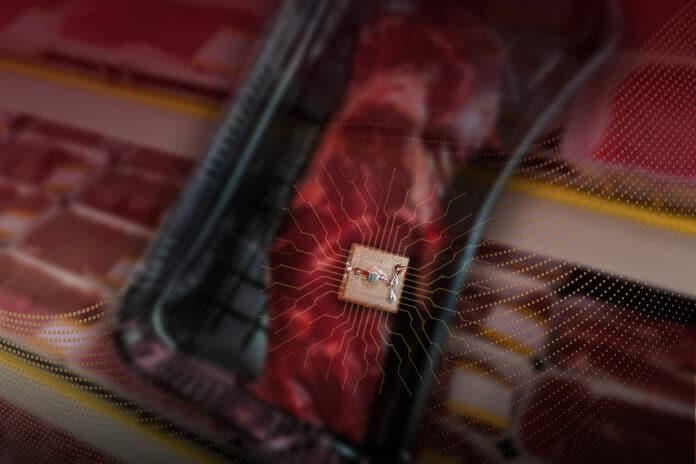Food spoilage results in food waste and food-borne diseases. They contribute to greenhouse emissions tremendously and amplify economic and environmental costs.
Current food monitoring processes are conducted in laboratories and use expensive chromatographic devices. Also, they require too much time, excessive resources, and qualified personnel.
Now, researchers at Koç University, Turkey, have developed a new user-friendly, cost-effective, and up-to-date sensor that can be applied to food directly and replace lab monitoring. The 2 x 2 cm miniature wireless device monitors food freshness in real-time, wirelessly and without a battery, and sends the results to a smartphone.
The sensor offers a capacitive measurement method and thus utilizes near-field communication (NFC) technology with power-free and wireless communication. This eliminates major disadvantages encountered in resistive devices, such as moisture sensitivity and incorrect data due to distance.
To demonstrate a real-life application, the wireless sensor was embedded into packaged chicken and beef; consecutive readings from meat samples using the sensor under various storage conditions enabled the monitoring of spoilage. While samples stored at room temperature showed an almost 700% change in sensor response on the third day, those stored in the freezer resulted in an insignificant change in sensor output.
The proposed low-cost, miniature wireless sensor nodes can be integrated into packaged foods, helping consumers and suppliers detect spoilage of protein-rich foods on demand and ultimately preventing food waste and food-borne diseases.
Once widely commercialized, researchers say, the device will enable continuous monitoring on shelves and allow users to control freshness right before buying a product or even before consumption at home. This opportunity for on-demand spoilage analysis via mobile phones will ultimately help prevent food waste and food-borne diseases.
With its cost-effectiveness and accessibility, the authors hope to contribute to the greater struggle against global warming and greenhouse emissions more effectively and quickly. The following steps will be to focus on increasing the potential for commercialization of the product in the near future.
Journal reference:
- Emin Istif, Hadi Mirzajani, Çağdaş Dağ, Fariborz Mirlou, Elif Yaren Ozuaciksoz, Cengiz Cakır, Hatice Ceylan Koydemir, Iskender Yilgor, Emel Yilgor, and Levent Beker. Miniaturized wireless sensor enables real-time monitoring of food spoilage. Nature Food, 2023; DOI: 10.1038/s43016-023-00750-9
